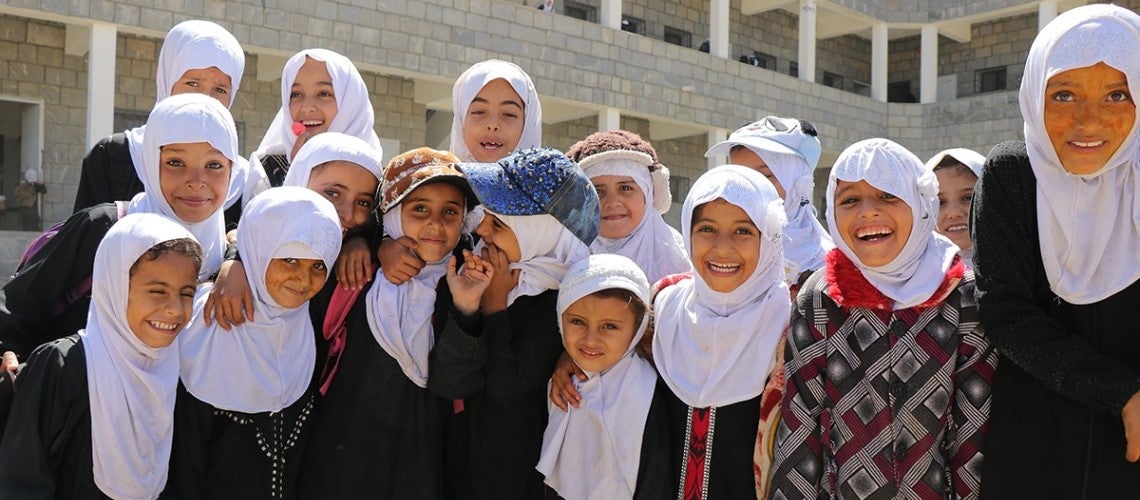 المشروع الطارئ للخدمات الحضرية المتكاملة في اليمن.
المشروع الطارئ للخدمات الحضرية المتكاملة في اليمن.
Yemen is confronting swarms of desert locusts, historic flooding, and the impact of COVID-19, all while enduring an ongoing conflict, now in its sixth year. The World Bank has been supporting Yemenis throughout the conflict, to help preserve their human capital and institutions. Raja Bentaouet Kattan, Yemen’s outgoing Country Manager, shares her insights on World Bank support to Yemen:
2020 has brought unprecedented disruptions across the globe. For Yemen, a country embroiled in conflict and home to some of the world’s most vulnerable, the challenges are immense on multiple fronts. Yemen is at a critical juncture as the peace process struggles to gain traction, the threat of famine looms, and COVID-19 continues to spread. In the face of immense need and funding shortfalls, it is crucial for the development community to mobilize resources, learn from what works, and continue to support the Yemeni people.
When I began as the World Bank Country Manager for Yemen two years ago, there was no road map for the World Bank operating in an active conflict context such as Yemen. The World Bank engagement has brought many firsts not only for me as a manager but also for the institution. It has been a true test of maintaining strategic focus while balancing tradeoffs between risks and results, as multiple new crises emerged. As I reflect on the World Bank engagement and the current context, I am convinced that the priorities that I highlighted when I first joined — of solidifying our investment to preserve human capital and institutions — are even more important today as is the importance of staying engaged even during conflict.
Since 2018, much has happened in terms of the Bank’s engagement in Yemen: A new Country Engagement Note framed our priorities, allowing us to increase support of critical service delivery. While our programs have achieved some exceptional results, a number of risks have also materialized, providing us with important lessons and prompting us to adapt in our response.
World Bank funding to Yemen has increased to US$1.81 billion, supporting health, water and sanitation (WASH), electricity, social protection, and new emergency operations in response to desert locusts and COVID-19. Assistance from the World Bank and other development partners has helped stave off health and economic outcomes that would be worse than they are. Nonetheless, the situation in Yemen is highly calamitous, and the country’s geographical fragmentation continues, despite hope that peace processes might help parties to the conflict reach a peaceful solution.
Within this context of uncertainty, development interventions can ensure Yemen does not lose more ground and can help pave the way for eventual reconstruction and recovery. The World Bank’s experience in Yemen shows that, even during a conflict, development interventions are possible — and of value. The Cash Transfer program, for example, implemented by the World Bank and UNICEF, has provided the equivalent of US$315 million to 9 million Yemenis, enabling them to buy food and other necessities. Investments in the health and energy sectors have kept Yemeni health workers and facilities operational, providing Yemenis a lifeline.
The interventions are evidence that the Bank should continue to support Yemen and other conflict-affected countries. Our engagement in Yemen is informing the World Bank's new strategy in countries characterized by fragility, conflict, and violence (FCV). We have remained engaged in Yemen by using innovative partnerships with United Nations agencies, as well as with national institutions, and learning to navigate implementation issues for which there is not always a reference along the way. We have also strengthened supervision by revisiting third party monitoring and introducing innovative technologies such as geo-tagging and remote monitoring, and engaging communities.
A few lessons emerging:
More fine-tuning
The model isn’t perfect and needs to continue to evolve. Given our lack of presence on the ground, the World Bank’s adapted model of engagement relies on third party implementation while maintaining the World Bank role in supervision and provision of technical expertise. Risks have indeed materialized including some weaknesses in fiduciary controls, which we have addressed proactively and jointly with our partners. We will continue to evaluate how to address risks as they arise, improve processes, and implement stronger financial management and safeguards systems. Flexibility and early communication are key factors for addressing risks early together with partners. We will also gradually empower local partners and communities further and continue to develop their capacity to implement and monitor critical programs.
The challenges require integrated solutions. Our urban services and electricity projects for example have provided electrical power and WASH to critical service delivery institutions, such as health centers and schools. We have been addressing food security from multiple angles, including through an agriculture project to help preserve productive capacity and through the locust response project to protect crops and restore livelihoods. Cash transfers, cash for work and private sector work on value chains and food imports all contribute to a multi-pronged approach.
Good data is essential in Yemen’s context. Our collaboration with the UN’s World Food Programme has allowed us to monitor people’s welfare and measure COVID-19’s effects using rapid mobile phone surveys. Solid analytical work can inform policy priorities, such as recent work on conflict-related shocks and impacts on access to education. Bolstering resilience is also crucial: local communities and segments of the private sector have shown resilience amid the deteriorating environment. Partnerships need to continue with these critical groups.
What comes next?
The World Bank is now preparing a new Yemen Country Engagement Note. We are reaffirming our commitment to supporting basic service delivery and preservation of human capital. The new CEN includes an explicit link to the COVID-19 response as a central part of the Bank’s strategy, both in direct support to the health and WASH sectors — building on the current COVID-19 Response and Emergency Health and Nutrition projects — and in the critical socioeconomic response, including school feeding, cash transfers and other livelihood support. The CEN strategy will include diversifying partners and a bigger role for national institutions, as well as new support for education, which is critical for preserving human capital.
The results achieved so far in Yemen are a testament to the collaboration of teams across sectors and institutions, and to the dedicated work of the task teams that continually adapt to changing situations and come up with new solutions. As we move forward, this work remains central to responding effectively to Yemen’s immediate crises as well as looking ahead to a stronger recovery. We must continue learning from implementation experience, working with Yemeni institutions and people, and thinking outside the box in order to help the country recover and ultimately build back better.


Join the Conversation